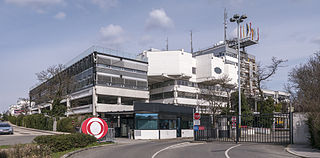
The Late Show with David Letterman is an American late-night talk show hosted by David Letterman on CBS, the first iteration of the Late Show franchise. The show debuted on August 30, 1993, and was produced by Letterman's production company, Worldwide Pants, and CBS Television Studios. The show's music director and leader of the house band, the CBS Orchestra, was Paul Shaffer. The head writer was Matt Roberts and the announcer was originally Bill Wendell, then Alan Kalter. In most U.S. markets the show aired from 11:35 p.m. to 12:35 a.m. Eastern and Pacific Time, and recorded Monday to Wednesdays at 4:30 p.m., and Thursdays at 3:30 p.m. and 6:00 p.m. Eastern Time. The second Thursday episode usually aired on Friday of that week.

The Vienna New Year's Concert is an annual concert of classical music performed by the Vienna Philharmonic on the morning of New Year's Day in Vienna, Austria. The concert occurs at the Musikverein at 11:15. The orchestra performs the same concert programme on 30 December, 31 December, and 1 January but only the last concert is regularly broadcast on radio and television.

Österreichischer Rundfunk is an Austrian national public broadcaster. Funded from a combination of television licence fee revenue and limited on-air advertising, ORF is the dominant player in the Austrian broadcast media. Austria was the last country in continental Europe after Albania to allow nationwide private television broadcasting, although commercial TV channels from neighbouring Germany have been present in Austria on pay-TV and via terrestrial overspill since the 1980s.

Mad Money is an American finance television program hosted by Jim Cramer that began airing on CNBC on March 14, 2005. Its main focus is investment and speculation, particularly in public company stocks.

Harry Hill's TV Burp is a British television comedy series produced by Avalon Television, and written and hosted by comedian Harry Hill. The show ran for 11 series between 2001 and 2012 on ITV1. Each episode sees the host take a humorous look back at the previous week of programming on British television from a range of shows aired on terrestrial and digital channels.
Aktenzeichen XY... ungelöst is a German interactive television programme first broadcast on 20 October 1967 on ZDF. Created by Eduard Zimmermann, it aims to combat and solve crimes. The programme is currently presented by Rudi Cerne. It airs monthly, with 12 episodes in a year, on Wednesday at 8:15 PM.
7 Tage, 7 Köpfe is a German comedy television program of the television station RTL Television and featured a humorous retrospective of the past week. The show was hosted by Jochen Busse.
Austria participated in the Eurovision Song Contest 2002 with the song "Say a Word" written by Robert Pfluger and Alexander Kahr. The song was performed by Manuel Ortega. The Austrian broadcaster Österreichischer Rundfunk (ORF) returned to the Eurovision Song Contest after a one-year absence following their relegation from 2001 as one of the bottom six countries in the 2000 contest. ORF organised the national final song://null.zwei in order to select the Austrian entry for the 2002 contest in Tallinn, Estonia. Ten songs competed in a televised show where an internet jury panel and a public vote selected "Say a Word" performed by Manuel Ortega as the winner.
Dimitrios Makulis, known as Jimmy Makulis, was a Greek singer who had a successful career in German-speaking markets in the 1950s and 1960s, and is known for his participation on behalf of Austria in the 1961 Eurovision Song Contest.

Larissa-Antonia Marolt is an Austrian fashion model and actress. She was the winner of the first cycle of Austria's Next Topmodel. After her victory she also participated in the fourth season of Germany's Next Top Model, where she was placed eighth.

"Gypsies, Tramps and Weed" is the seventh episode of the third season of the American television series Will & Grace. It was written by Katie Palmer and directed by series producer James Burrows. The episode originally aired on NBC in the United States on November 16, 2000. Guest stars in "Gypsies, Tramps and Weed" include Cher, Camryn Manheim, and Robert Romanus.

Robert Heinrich Palfrader is an Austrian actor, comedian and author.
Austria participated in the Eurovision Song Contest in 2011 with the song "The Secret Is Love" written by Thomas Rabitsch and Nadine Beiler. The song was performed by Nadine Beiler. In July 2010, the Austrian broadcaster Österreichischer Rundfunk (ORF) announced that they would be returning to the Eurovision Song Contest after a three-year absence following their withdrawal in 2008. ORF organised the national final Düsseldorf - wir kommen! in order to select the Austrian entry for the 2011 contest in Düsseldorf, Germany. Thirty songs competed in an online voting round titled Guten Morgen Düsseldorf, of which ten were selected to proceed to the national final. The ten songs competed in a televised show where two rounds of public voting selected the winner. The first round selected the top three entries to proceed to the second round, during which "The Secret Is Love" performed by Nadine Beiler was selected as the winner after gaining 46.73% of the votes.

Musikantenstadl is a live television entertainment program broadcast in the German language throughout Austria, Germany, and Switzerland. It features Austrian, Swiss, and German popular folk music, international pop and folk music as well as interviews and comedy. As a production of Eurovision, is co-produced by the Österreichischer Rundfunk, Bayerischer Rundfunk and Schweizer Radio und Fernsehen. Aside from the live television broadcasts it also tours in Austria and Germany as live concerts. It is currently hosted by Andy Borg and its location of broadcast varies between towns in different regions in Austria, Germany, and Switzerland.

"Angry Dad: The Movie'" is the fourteenth episode of the twenty-second season of the American animated television series The Simpsons. It originally aired on the Fox network in the United States on February 20, 2011. In this episode, Bart wins many awards for his new short film based on his web cartoon series Angry Dad, which was first introduced in "I Am Furious (Yellow)", while Homer takes credit for the film during acceptance speeches.
"The Ned-Liest Catch" is the twenty-second and final episode of the twenty-second season of the American animated television series The Simpsons. The episode was directed by Chuck Sheetz and written by Jeff Westbrook. It originally aired on the Fox network in the United States on May 22, 2011.

Philipp Riederle is a German author, consultant and keynote speaker. At the age of 13 he became famous with his podcast “Mein iPhone und Ich…” , with which he reached over one million viewers each year.

Schalkse Ruiters, translated as "Roguish Horsemen", was a Flemish humoristic TV talk and game show, broadcast on the TV channel Eén between late 1996 and early 1998. The program was a cross between a comedy show, a talk show, a game show and a mockumentary. Hosted by Bart De Pauw and Tom Lenaerts viewers were shown three video reports about three different topics. The people in the studio and viewers at home had to vote whether they believed each individual video to be real or staged. In between these reports hidden camera segments and comedy sketches were shown.

The heute-show is a German late-night satirical television program airing every Friday evening on public broadcasting channel ZDF. A conceptual adaptation of The Daily Show with Jon Stewart, it is presented by German comedian and journalist Oliver Welke. Heute show presents the weekly news with funny or sarcastic and cynical comments, especially focusing on issues that are subject of the latest political discussions in Germany. Welke argues that he might help to make people interested in politics and might help to point out "what goes the wrong way" in parliamentary debates, in ministries, in institutions, and in parties. Sometimes, he simply mocks "people who deserve it" in his show.
Austria participated in the Eurovision Song Contest 2003 with the song "Weil der Mensch zählt" written and performed by Alf Poier. The Austrian broadcaster Österreichischer Rundfunk (ORF) organised the national final Song.Null.Drei in order to select the Austrian entry for the 2003 contest in Riga, Latvia. Ten songs competed in a televised show where a public vote split between male and female voters exclusively selected "Weil der Mensch zählt" performed by Alf Poier as the winner.













